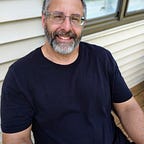Shooter
Who Matters, Who Doesn’t, and Who Decides?
A troubled boy walks into a school and shoots it full of holes, killing several of his classmates and two teachers before turning the gun on himself. A few of the dead knew the boy, while others reportedly never interacted with him at all.
I wish I were just introducing the plot to a macabre short story. Unfortunately, some variation of this unimaginable horror has actually occurred in the United States many times dating back to the mid-1800s.
Columbine in 1999 might have been one of my first exposures, but school shootings have continued with jaw-dropping frequency throughout the first two decades of the twenty-first century. In fact, CNN reported in 2018 that there have been at least 288 school shootings in the United States since January 1, 2009 — 57 times as many as the other major industrialized nations combined.
In the aftermath of these killing sprees, most of us naturally think about the murdered students first, about the unrealized potential of young life lost and about how unfair and senseless their deaths were. Then perhaps our thoughts turn to the parents of the massacred. What’s left for them? How do they possibly move forward when there’s no bringing order to this?
Finally, our thoughts move to the shooter himself, and of course anger dominates. What in hell could make a person do something so utterly pointless? We have no answer. We only hope he rots in hell for all eternity paying for this unforgivable sin.
But there are two people in this scenario who maybe don’t cross our minds at all, forgotten in all the emotion we don’t know how to process. For some reason, though, I’ve thought about them a lot. I’m sitting here thinking about them tonight.
What about the shooter’s parents? What’s to become of them? They had a child and raised him. They have memories like those of any parents, not of a monster but of a toddler taking his first steps and of a little boy boarding the school bus for the first time and of birthday parties and holidays and sporting events.
Call them blind or oblivious if you want, but maybe they didn’t even see this side of him. Kids can be too good at keeping parents in the dark.
Now they’re left to mourn completely alone. The world mourns with the victims’ families, while the shooter’s family is ostracized even by former friends.
They birthed this abomination. They can burn in hell with it.
They might choose the real hell over this hell on earth, but it’s not an option — not yet anyway. They’re stuck here for now on the fringes of a society that scorns them. Perhaps they’ll eventually change their names, sell their home, and move away, but the dark cloud will follow.
I don’t know why I ponder the fate of the forsaken. Maybe it’s because I lost a child myself, and having experienced that complete emptiness, I know I would be just as heartbroken regardless of what my child may have done. Maybe it’s because I’ve judged others and harbor some guilt. Maybe I just want to understand an incomprehensible world full of all kinds of pain and unimaginable suffering.
I finally got around to reading Man’s Search for Meaning recently. In it, Viktor Frankl writes about not judging the Nazi death camp soldiers, because he didn’t experience the same circumstances they did that may have led to their actions. He also writes about the value and meaning of every life, even in the most hopeless conditions like those he endured. For those who may not know his story, Frankl’s wife, parents, and brother all died in the camps.
Not many people have the empathy of a Viktor Frankl to say the least, but I think the answers to some of my questions might lie somewhere in his reverence for life. On a broader scale than my own late night musings, I wish we could find some similar answers as a nation, because right now I have this sinking feeling we’re collectively more lost than at any point in my lifetime.
Yet I know we’re not likely to find or to even look for answers, and that the bloodshed and blaming will continue in schools, on street corners, and in the fields of war, because we’ve ceased to matter to each other. I’m not even sure we ever did.
